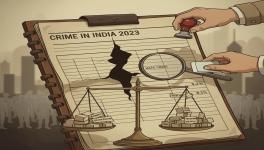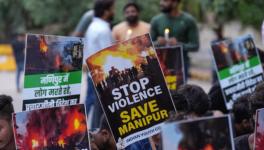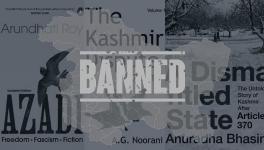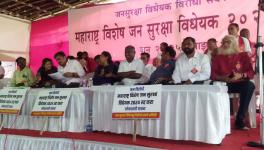Can Stan Swamy’s PIL be Blueprint for Justice to Thousands of Languishing UAPA Undertrials?
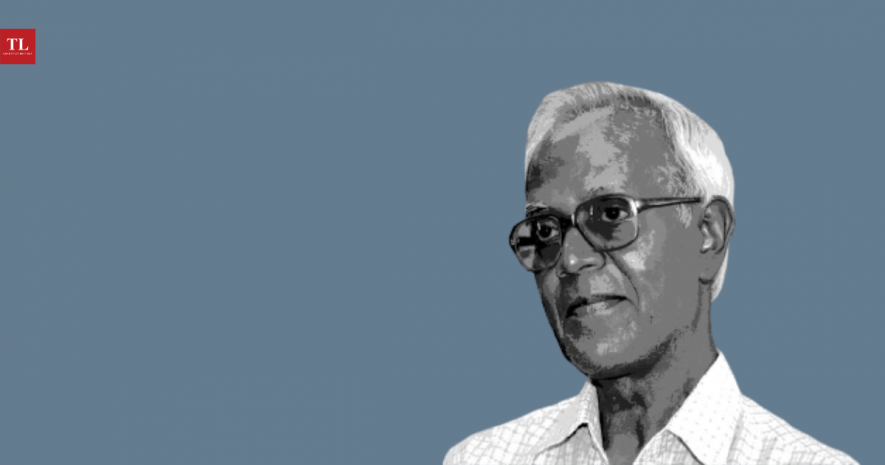
Can the judgment which granted bail to Vernon Gonsalves and Arun Ferreira form the basis for implementation of the same principles for granting bail to other accused in the Bhima Koregaon–Elgar Parishad case as well as to the other 500 detenues in Jharkhand who are still at the pre- or post-trial stage?
ON August 8, the Karnataka Chapter of the People’s Union for Civil Liberties (PUCL-K) held a discussion on the bail jurisprudence under the Unlawful Activities (Prevention) Act, 1967 (UAPA) and its implications on the fundamental right of undertrials to a speedy trial.
The discussion was held in the context of the grant of regular bail to Vernon Gonsalves and Arun Ferreira, accused in the Bhima Koregaon–Elgar Parishad case, by the Supreme Court on July 28.
Gonsalves is a trade unionist and activist and Ferreira is a lawyer and activist. The bail was granted considering their long incarceration without trial.
Both the accused have been held in custody since August 2018 on allegations of involvement in offences under the UAPA.
The Bench comprising Justices Aniruddha Bose and Sudhanshu Dhulia, observed that the materials eluded to as part of incriminating evidence against the accused persons cannot justify their continued custody.
In contrast to other laws, the UAPA takes away judicial discretion and prohibits the courts from granting bail when certain conditions are met, that is, when there are reasonable grounds for believing that allegations against the accused are prima facie true, Chitkara explained.
In particular, the bail judgment holds that the letters recovered from the other co-accused persons, witness statements, or the mere possession of inflammatory literature, even if it propagates violence or promotes the overthrow of a democratically elected government, does not prove that the two accused were involved in terrorist acts within the definition of the UAPA.
‘The lawless law’
During the discussion organised by the PUCL, Radhika Chitkara, assistant professor of law at the National Law School of India University, Bengaluru and secretary of the People’s Union for Democratic Rights, delved into the bail-restricting provisions of the UAPA.
In contrast to other laws, the UAPA takes away judicial discretion and prohibits the courts from granting bail when certain conditions are met, that is, when there are reasonable grounds for believing that allegations against the accused are prima facie true, Chitkara explained.
Under the UAPA, the State does not have to prove the guilt of the accused ‘beyond reasonable doubt’. The State only has to “superficially” prove the guilt of the accused, Chitkara added.
In National Investigation Agency versus Zahoor Ahmad Shah Watali (2019), the Supreme Court held that while adjudicating a bail plea, courts should not go into question of the admissibility of the evidence produced by the investigation agencies.
“The duty of the court at this stage is not to weigh the evidence meticulously but to arrive at a finding on the basis of broad probabilities,” the judgment reads.
According to Chitakara, while obtaining a bail under the UAPA was already very difficult, Watali further gagged the accused by not allowing them to defend themselves against the charges.
“All that is relevant is the word of the investigation agency,” Chitakara said.
Chitkara highlights that only 3–5 percent of cases registered under the UAPA end up in conviction, which implies that in a vast majority of the cases, the evidence produced by the investigation agency is not reliable.
The law “accomplishes the same result [of conviction] by denying bail,” Chitkara stated.
Clifton D’ Rozario, termed the UAPA, along with other stringent laws such as the Prevention of Money Laundering Act, 2002, as “lawless laws” for facilitating pre-conviction or pre-trial incarceration.
Continuing with the discussion, Clifton D’ Rozario, national convenor of All India Lawyers Association for Justice, termed the UAPA, along with other stringent laws such as the Prevention of Money Laundering Act, 2002, as “lawless laws” for facilitating pre-conviction or pre-trial incarceration.
A case for blanket application?
Chitkara opined that Gonsalves and Ferreira’s bail judgment “loosens the grip” from Watali by bringing in surface-level scrutiny to the evidence produced by the National Investigation Agency.
The judgement upholds their plea of bail irrespective of the harsh bail conditions under the UAPA, which allows their prolonged incarceration before conviction.
D’Rozario states that in the Bhima Koregaon case, the charges are not yet framed, but the prosecution has filed a chargesheet exceeding 5,000 pages and intends to cross-examine at least 200 witnesses.
D’Rozario raised serious concerns about the long period of time it is bound to take for the trial to commence.
Notably, 10 of the 16 accused persons are presently incarcerated in the Bhima Koregaon case, having now spent between two to almost five years in judicial custody without trial.
In addition to Gonsalves and Ferreira, three of the other accused persons, Sudha Bharadwaj, Varavara Rao and Dr Anand Teltumbde, have also managed to secure bail so far.
Another accused, tribal rights activist and Jesuit priest Father Stan Swamy, passed away in judicial custody in July 2021. He was awaiting bail on medical grounds.
D’Rozario reiterated that in Gonsalves and Ferreira’s bail judgment, the court delved into all the material recovered from the electronic devices of other co-accused persons, and held that no prima facie case was made out against the accused persons.
Further, D’Rozario expressed hope that the judgment will open doors for bail to others incarcerated under the Bhima Koregaon case.
On the strength of the judgment, it is also important to shape demand or a campaign for the push to grant bail for all those incarcerated on similar grounds under the UAPA, D’Rozario emphasised.
A public interest litigation (PIL) filed by the late Father Stan Swamy in 2017 in the Jharkhand High Court may serve as a path in the direction of ending incarceration of the disturbingly large number of those held in custody without a trial.
Swamy’s petition
The PIL was filed by co-petitioner Father Swamy as convenor of Persecuted Prisoners Solidarity Committee, a voluntary civil society group; and as a founder of Bagaicha, a centre for social action.
The PIL, which is the result of research and investigation conducted between 2012 and 2016, outlines the prolonged detention of the members of the Scheduled Castes, Scheduled Tribes and Other Backward Classes across jails in Jharkhand.
As of February 2017, according to the research, about 500 detenues in the state had been booked for various offences under the Indian Penal Code, 1860, the UAPA, the Arms Act, 1959 and the Explosive Substances Act, 1908 and were facing delay in pre-trial and trial proceedings, for no fault of theirs.
As of February 2017, according to the research, about 500 detenues in the state had been booked for various offences under the Indian Penal Code, 1860, the UAPA, the Arms Act, 1959 and the Explosive Substances Act, 1908 and were facing delay in pre-trial and trial proceedings, for no fault of theirs.
According to the petition, such inordinate delay amounts to a violation of fundamental right to life and personal liberty and the right to a speedy trial guaranteed under Article 21 of the Constitution of India.
The PIL also pointed out that jails in Jharkhand had failed to implement the recommendations of the 1983 Report of the All India Committee on Jail Reforms (also known as Justice Mulla Committee) on the rights of prisoners in the country.
The petition prays for constituting a commission of inquiry to conduct an in-depth and comprehensive fact-finding inquiry on undertrials in Jharkhand and record the present state of affairs.
Causes for prolonged detention
According to the petition, 93.5 percent prisoners at Chaibasa, West Singhbhum district in Jharkhand, continued to be incarcerated due to inordinate or undue delay on account of several reasons.
For instance, several cases were found to be “stuck up” at the stage of framing of charges for as long as four years or at the trial stage for three to ten years, the PIL states.
The petition says that the trial courts “frequently displayed undue leniency” by granting adjournments to the prosecution, including when the witnesses failed to be present for multiple hearing dates.
The petition states that delay in trial and pre-trial proceedings is caused due to the absence of government sanction for cognisance of offences as provided under Section 45 of the UAPA.
The petition further states that the delay is also caused due to other systemic shortcomings, official callousness and administrative measures such as the State seeking continuous adjournments.
The petitioners averred that denial of bail to undertrials on grounds of the seriousness of the offence or the inability to furnish sureties, as found in several cases, amount to failure of justice.
In absence of concrete and substantive evidence, as well as due to non-compliance of arrest and post-arrest procedure laid down in D.K. Basu versus State of West Bengal (1997), the petition highlights the probability of several cases ultimately resulting in acquittals.
The petition refers to cases such as Hussainara Khatoon and Others versus Home Secretary, State of Bihar (1979), P. Ramachandra Rao versus State of Karnataka (2002) and Abdul Rehman Antulay and Others versus R.S. Nayak and Another (1992) to advocate the right of prisoners to a speedy trial.
Highlighting the urgency to address the issue of prolonged detention of prisoners due to delay in proceedings, the petition points out the inhuman practices in the jails of Jharkhand and compares them to a “zoo”.
Father Stan Swamy’s petition is still ongoing in the Jharkhand High Court.
Among its recent Orders, the high court has used the petition as a foundation to demand accountability from the state government and the prison administration, including by instituting a requirement of submission of status reports by the authorities.
The petition says that the trial courts “frequently displayed undue leniency” by granting adjournments to the prosecution, including when the witnesses failed to be present for multiple hearing dates.
For instance, in the Order dated July 24 of this year, a high court Bench comprising Chief Justice Sanjaya Kumar Mishra and Justice Ananda Sen took notice of the news highlighting 81 percent vacancy in the post of prison or correctional officials.
The Bench directed the state to file an affidavit on the exact vacancy of the officials and the steps taken by the state government to fill up the vacancies.
In addition, in an Order dated April 6 of this year, the high court directed the finalising of the jail manual as stipulated by the advocate general of Jharkhand.
Conclusion
According to data from the National Crime Records Bureau (NCRB), as of 2021, investigation was pending in around 3,998 cases registered under the UAPA
Over 172 cases had not reached the stage of trial for a decade or more, across states and Union territories in the country.
Reportedly, on analysis of the NCRB’s data, between 2014–20, 10,552 people were arrested under the UAPA and only 253 were convicted, whereas the number of pending cases rose by 14.38 percent each year throughout that period.
In view of these alarming statistics, can a blanket implementation of Gonsalves and Ferreira’s bail judgment be the way forward to ensure that justice can finally take charge through the grant of bail to thousands incarcerated on similar grounds under the UAPA?
Sarah Thanawala is a staff writer at The Leaflet
Get the latest reports & analysis with people's perspective on Protests, movements & deep analytical videos, discussions of the current affairs in your Telegram app. Subscribe to NewsClick's Telegram channel & get Real-Time updates on stories, as they get published on our website.










